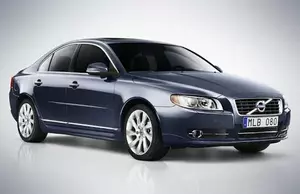
| Vehicle | Precise engine size | Difference from world average | Engine size to consumption ratio | Horsepower from 1 L | Engine size to 100 kg of weight |
|---|---|---|---|---|---|
| 1.6 T4F |
1.6 L (1596 cc) |
32% smaller | 47 cc to 1 mpg | 113 hp from 1 L | 100 cc to 100 kg |
| 1.6 D2 |
1.56 L (1560 cc) |
33.5% smaller | 30 cc to 1 mpg | 74 hp from 1 L | 98 cc to 100 kg |
| 2.0 D3 |
1.98 L (1984 cc) |
15.4% smaller | 42 cc to 1 mpg | 69 hp from 1 L | 124 cc to 100 kg |
| 1.6 T4 |
1.6 L (1596 cc) |
32% smaller | 48 cc to 1 mpg | 113 hp from 1 L | 89 cc to 100 kg |
| 2.0 D4 |
1.97 L (1969 cc) |
16.1% smaller | 38 cc to 1 mpg | 92 hp from 1 L | 123 cc to 100 kg |
| 2.4 D5 |
2.4 L (2400 cc) |
2.3% bigger | 60 cc to 1 mpg | 90 hp from 1 L | 150 cc to 100 kg |
| 2.0 T5 |
1.97 L (1969 cc) |
16.1% smaller | 52 cc to 1 mpg | 124 hp from 1 L | 123 cc to 100 kg |
| 3.0 T6 |
2.95 L (2953 cc) |
25.9% bigger | 123 cc to 1 mpg | 103 hp from 1 L | 185 cc to 100 kg |
| Vehicle | 1.6 T4F |
|---|---|
| Precise engine size | 1.6 L (1596 cc) |
| Difference from world average | 32 smaller |
| Engine size to consumption ratio | 47 cc to 1 mpg |
| Horsepower from 1 L | 113 hp from 1 L |
| Engine size to 100 kg of weight | 100 cc to 100 kg |
| Vehicle | 1.6 D2 |
| Precise engine size | 1.56 L (1560 cc) |
| Difference from world average | 33.5 smaller |
| Engine size to consumption ratio | 30 cc to 1 mpg |
| Horsepower from 1 L | 74 hp from 1 L |
| Engine size to 100 kg of weight | 98 cc to 100 kg |
| Vehicle | 2.0 D3 |
| Precise engine size | 1.98 L (1984 cc) |
| Difference from world average | 15.4 smaller |
| Engine size to consumption ratio | 42 cc to 1 mpg |
| Horsepower from 1 L | 69 hp from 1 L |
| Engine size to 100 kg of weight | 124 cc to 100 kg |
| Vehicle | 1.6 T4 |
| Precise engine size | 1.6 L (1596 cc) |
| Difference from world average | 32 smaller |
| Engine size to consumption ratio | 48 cc to 1 mpg |
| Horsepower from 1 L | 113 hp from 1 L |
| Engine size to 100 kg of weight | 89 cc to 100 kg |
| Vehicle | 2.0 D4 |
| Precise engine size | 1.97 L (1969 cc) |
| Difference from world average | 16.1 smaller |
| Engine size to consumption ratio | 38 cc to 1 mpg |
| Horsepower from 1 L | 92 hp from 1 L |
| Engine size to 100 kg of weight | 123 cc to 100 kg |
| Vehicle | 2.4 D5 |
| Precise engine size | 2.4 L (2400 cc) |
| Difference from world average | 2.3 bigger |
| Engine size to consumption ratio | 60 cc to 1 mpg |
| Horsepower from 1 L | 90 hp from 1 L |
| Engine size to 100 kg of weight | 150 cc to 100 kg |
| Vehicle | 2.0 T5 |
| Precise engine size | 1.97 L (1969 cc) |
| Difference from world average | 16.1 smaller |
| Engine size to consumption ratio | 52 cc to 1 mpg |
| Horsepower from 1 L | 124 hp from 1 L |
| Engine size to 100 kg of weight | 123 cc to 100 kg |
| Vehicle | 3.0 T6 |
| Precise engine size | 2.95 L (2953 cc) |
| Difference from world average | 25.9 bigger |
| Engine size to consumption ratio | 123 cc to 1 mpg |
| Horsepower from 1 L | 103 hp from 1 L |
| Engine size to 100 kg of weight | 185 cc to 100 kg |
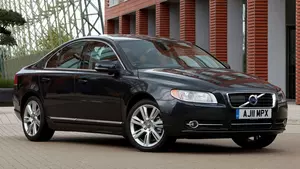
| Vehicle | Precise engine size | Difference from world average | Engine size to consumption ratio | Horsepower from 1 L | Engine size to 100 kg of weight |
|---|---|---|---|---|---|
| 2.0 D3 |
1.98 L (1984 cc) |
15.4% smaller | 47 cc to 1 mpg | 82 hp from 1 L | 124 cc to 100 kg |
| 1.6 Drive |
1.56 L (1560 cc) |
33.5% smaller | 30 cc to 1 mpg | 74 hp from 1 L | 104 cc to 100 kg |
| 2.4 D5 |
2.4 L (2400 cc) |
2.3% bigger | 62 cc to 1 mpg | 90 hp from 1 L | 150 cc to 100 kg |
| 2.4 D5 AWD |
2.4 L (2400 cc) |
2.3% bigger | 65 cc to 1 mpg | 90 hp from 1 L | 141 cc to 100 kg |
| 1.6 T4 |
1.6 L (1596 cc) |
32% smaller | 44 cc to 1 mpg | 113 hp from 1 L | 106 cc to 100 kg |
| 3.2 |
3.19 L (3192 cc) |
36.1% bigger | 123 cc to 1 mpg | 76 hp from 1 L | 200 cc to 100 kg |
| 2.0 T5 |
2 L (1999 cc) |
14.8% smaller | 67 cc to 1 mpg | 120 hp from 1 L | 125 cc to 100 kg |
| 1.6 T4F |
1.6 L (1596 cc) |
32% smaller | 47 cc to 1 mpg | 113 hp from 1 L | 100 cc to 100 kg |
| 3.2 AWD |
3.19 L (3192 cc) |
36.1% bigger | 128 cc to 1 mpg | 76 hp from 1 L | 188 cc to 100 kg |
| 3.0 T6 AWD |
2.95 L (2953 cc) |
25.9% bigger | 123 cc to 1 mpg | 103 hp from 1 L | 174 cc to 100 kg |
| Vehicle | 2.0 D3 |
|---|---|
| Precise engine size | 1.98 L (1984 cc) |
| Difference from world average | 15.4 smaller |
| Engine size to consumption ratio | 47 cc to 1 mpg |
| Horsepower from 1 L | 82 hp from 1 L |
| Engine size to 100 kg of weight | 124 cc to 100 kg |
| Vehicle | 1.6 Drive |
| Precise engine size | 1.56 L (1560 cc) |
| Difference from world average | 33.5 smaller |
| Engine size to consumption ratio | 30 cc to 1 mpg |
| Horsepower from 1 L | 74 hp from 1 L |
| Engine size to 100 kg of weight | 104 cc to 100 kg |
| Vehicle | 2.4 D5 |
| Precise engine size | 2.4 L (2400 cc) |
| Difference from world average | 2.3 bigger |
| Engine size to consumption ratio | 62 cc to 1 mpg |
| Horsepower from 1 L | 90 hp from 1 L |
| Engine size to 100 kg of weight | 150 cc to 100 kg |
| Vehicle | 2.4 D5 AWD |
| Precise engine size | 2.4 L (2400 cc) |
| Difference from world average | 2.3 bigger |
| Engine size to consumption ratio | 65 cc to 1 mpg |
| Horsepower from 1 L | 90 hp from 1 L |
| Engine size to 100 kg of weight | 141 cc to 100 kg |
| Vehicle | 1.6 T4 |
| Precise engine size | 1.6 L (1596 cc) |
| Difference from world average | 32 smaller |
| Engine size to consumption ratio | 44 cc to 1 mpg |
| Horsepower from 1 L | 113 hp from 1 L |
| Engine size to 100 kg of weight | 106 cc to 100 kg |
| Vehicle | 3.2 |
| Precise engine size | 3.19 L (3192 cc) |
| Difference from world average | 36.1 bigger |
| Engine size to consumption ratio | 123 cc to 1 mpg |
| Horsepower from 1 L | 76 hp from 1 L |
| Engine size to 100 kg of weight | 200 cc to 100 kg |
| Vehicle | 2.0 T5 |
| Precise engine size | 2 L (1999 cc) |
| Difference from world average | 14.8 smaller |
| Engine size to consumption ratio | 67 cc to 1 mpg |
| Horsepower from 1 L | 120 hp from 1 L |
| Engine size to 100 kg of weight | 125 cc to 100 kg |
| Vehicle | 1.6 T4F |
| Precise engine size | 1.6 L (1596 cc) |
| Difference from world average | 32 smaller |
| Engine size to consumption ratio | 47 cc to 1 mpg |
| Horsepower from 1 L | 113 hp from 1 L |
| Engine size to 100 kg of weight | 100 cc to 100 kg |
| Vehicle | 3.2 AWD |
| Precise engine size | 3.19 L (3192 cc) |
| Difference from world average | 36.1 bigger |
| Engine size to consumption ratio | 128 cc to 1 mpg |
| Horsepower from 1 L | 76 hp from 1 L |
| Engine size to 100 kg of weight | 188 cc to 100 kg |
| Vehicle | 3.0 T6 AWD |
| Precise engine size | 2.95 L (2953 cc) |
| Difference from world average | 25.9 bigger |
| Engine size to consumption ratio | 123 cc to 1 mpg |
| Horsepower from 1 L | 103 hp from 1 L |
| Engine size to 100 kg of weight | 174 cc to 100 kg |
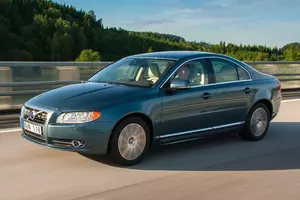
| Vehicle | Precise engine size | Difference from world average | Engine size to consumption ratio | Horsepower from 1 L | Engine size to 100 kg of weight |
|---|---|---|---|---|---|
| 2.5 T |
2.52 L (2521 cc) |
7.5% bigger | 93 cc to 1 mpg | 92 hp from 1 L | 158 cc to 100 kg |
| 2.0F |
2 L (1999 cc) |
14.8% smaller | 71 cc to 1 mpg | 73 hp from 1 L | 125 cc to 100 kg |
| 1.6 D DRIVE |
1.56 L (1560 cc) |
33.5% smaller | 33 cc to 1 mpg | 70 hp from 1 L | 98 cc to 100 kg |
| 2.0 D |
2 L (1997 cc) |
14.9% smaller | 49 cc to 1 mpg | 68 hp from 1 L | 125 cc to 100 kg |
| 3.0 T6 AWD |
2.95 L (2953 cc) |
25.9% bigger | 141 cc to 1 mpg | 97 hp from 1 L | 164 cc to 100 kg |
| 2.4 D |
2.4 L (2400 cc) |
2.3% bigger | 67 cc to 1 mpg | 73 hp from 1 L | 150 cc to 100 kg |
| 2.4 D5 |
2.4 L (2400 cc) |
2.3% bigger | 69 cc to 1 mpg | 85 hp from 1 L | 150 cc to 100 kg |
| 2.4 D5 AWD |
2.4 L (2400 cc) |
2.3% bigger | 75 cc to 1 mpg | 85 hp from 1 L | 141 cc to 100 kg |
| Vehicle | 2.5 T |
|---|---|
| Precise engine size | 2.52 L (2521 cc) |
| Difference from world average | 7.5 bigger |
| Engine size to consumption ratio | 93 cc to 1 mpg |
| Horsepower from 1 L | 92 hp from 1 L |
| Engine size to 100 kg of weight | 158 cc to 100 kg |
| Vehicle | 2.0F |
| Precise engine size | 2 L (1999 cc) |
| Difference from world average | 14.8 smaller |
| Engine size to consumption ratio | 71 cc to 1 mpg |
| Horsepower from 1 L | 73 hp from 1 L |
| Engine size to 100 kg of weight | 125 cc to 100 kg |
| Vehicle | 1.6 D DRIVE |
| Precise engine size | 1.56 L (1560 cc) |
| Difference from world average | 33.5 smaller |
| Engine size to consumption ratio | 33 cc to 1 mpg |
| Horsepower from 1 L | 70 hp from 1 L |
| Engine size to 100 kg of weight | 98 cc to 100 kg |
| Vehicle | 2.0 D |
| Precise engine size | 2 L (1997 cc) |
| Difference from world average | 14.9 smaller |
| Engine size to consumption ratio | 49 cc to 1 mpg |
| Horsepower from 1 L | 68 hp from 1 L |
| Engine size to 100 kg of weight | 125 cc to 100 kg |
| Vehicle | 3.0 T6 AWD |
| Precise engine size | 2.95 L (2953 cc) |
| Difference from world average | 25.9 bigger |
| Engine size to consumption ratio | 141 cc to 1 mpg |
| Horsepower from 1 L | 97 hp from 1 L |
| Engine size to 100 kg of weight | 164 cc to 100 kg |
| Vehicle | 2.4 D |
| Precise engine size | 2.4 L (2400 cc) |
| Difference from world average | 2.3 bigger |
| Engine size to consumption ratio | 67 cc to 1 mpg |
| Horsepower from 1 L | 73 hp from 1 L |
| Engine size to 100 kg of weight | 150 cc to 100 kg |
| Vehicle | 2.4 D5 |
| Precise engine size | 2.4 L (2400 cc) |
| Difference from world average | 2.3 bigger |
| Engine size to consumption ratio | 69 cc to 1 mpg |
| Horsepower from 1 L | 85 hp from 1 L |
| Engine size to 100 kg of weight | 150 cc to 100 kg |
| Vehicle | 2.4 D5 AWD |
| Precise engine size | 2.4 L (2400 cc) |
| Difference from world average | 2.3 bigger |
| Engine size to consumption ratio | 75 cc to 1 mpg |
| Horsepower from 1 L | 85 hp from 1 L |
| Engine size to 100 kg of weight | 141 cc to 100 kg |
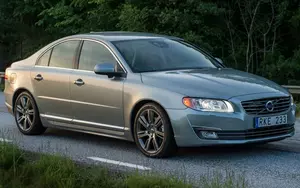
| Vehicle | Precise engine size | Difference from world average | Engine size to consumption ratio | Horsepower from 1 L | Engine size to 100 kg of weight |
|---|---|---|---|---|---|
| 2.5 D5 |
2.4 L (2400 cc) |
2.3% bigger | 65 cc to 1 mpg | 77 hp from 1 L | 160 cc to 100 kg |
| 2.5FT |
2.52 L (2521 cc) |
7.5% bigger | 97 cc to 1 mpg | 79 hp from 1 L | 168 cc to 100 kg |
| 2.5 i T |
2.52 L (2521 cc) |
7.5% bigger | 97 cc to 1 mpg | 79 hp from 1 L | 168 cc to 100 kg |
| 3.2 i |
3.19 L (3192 cc) |
36.1% bigger | 133 cc to 1 mpg | 75 hp from 1 L | 213 cc to 100 kg |
| 4.4 i V8 |
4.41 L (4414 cc) |
88.2% bigger | 221 cc to 1 mpg | 71 hp from 1 L | 260 cc to 100 kg |
| 4.4 i V8 AWD |
4.41 L (4414 cc) |
88.2% bigger | 221 cc to 1 mpg | 71 hp from 1 L | 260 cc to 100 kg |
| Vehicle | 2.5 D5 |
|---|---|
| Precise engine size | 2.4 L (2400 cc) |
| Difference from world average | 2.3 bigger |
| Engine size to consumption ratio | 65 cc to 1 mpg |
| Horsepower from 1 L | 77 hp from 1 L |
| Engine size to 100 kg of weight | 160 cc to 100 kg |
| Vehicle | 2.5FT |
| Precise engine size | 2.52 L (2521 cc) |
| Difference from world average | 7.5 bigger |
| Engine size to consumption ratio | 97 cc to 1 mpg |
| Horsepower from 1 L | 79 hp from 1 L |
| Engine size to 100 kg of weight | 168 cc to 100 kg |
| Vehicle | 2.5 i T |
| Precise engine size | 2.52 L (2521 cc) |
| Difference from world average | 7.5 bigger |
| Engine size to consumption ratio | 97 cc to 1 mpg |
| Horsepower from 1 L | 79 hp from 1 L |
| Engine size to 100 kg of weight | 168 cc to 100 kg |
| Vehicle | 3.2 i |
| Precise engine size | 3.19 L (3192 cc) |
| Difference from world average | 36.1 bigger |
| Engine size to consumption ratio | 133 cc to 1 mpg |
| Horsepower from 1 L | 75 hp from 1 L |
| Engine size to 100 kg of weight | 213 cc to 100 kg |
| Vehicle | 4.4 i V8 |
| Precise engine size | 4.41 L (4414 cc) |
| Difference from world average | 88.2 bigger |
| Engine size to consumption ratio | 221 cc to 1 mpg |
| Horsepower from 1 L | 71 hp from 1 L |
| Engine size to 100 kg of weight | 260 cc to 100 kg |
| Vehicle | 4.4 i V8 AWD |
| Precise engine size | 4.41 L (4414 cc) |
| Difference from world average | 88.2 bigger |
| Engine size to consumption ratio | 221 cc to 1 mpg |
| Horsepower from 1 L | 71 hp from 1 L |
| Engine size to 100 kg of weight | 260 cc to 100 kg |
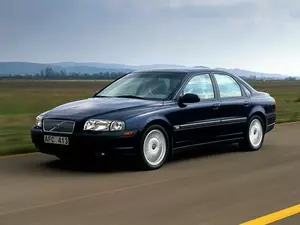
| Vehicle | Precise engine size | Difference from world average | Engine size to consumption ratio | Horsepower from 1 L | Engine size to 100 kg of weight |
|---|---|---|---|---|---|
| 2.4 i 20V |
2.44 L (2435 cc) |
3.8% bigger | 94 cc to 1 mpg | 70 hp from 1 L | 128 cc to 100 kg |
| Vehicle | 2.4 i 20V |
|---|---|
| Precise engine size | 2.44 L (2435 cc) |
| Difference from world average | 3.8 bigger |
| Engine size to consumption ratio | 94 cc to 1 mpg |
| Horsepower from 1 L | 70 hp from 1 L |
| Engine size to 100 kg of weight | 128 cc to 100 kg |
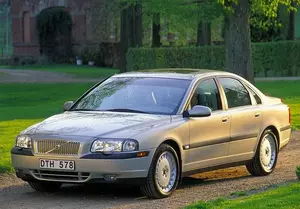
| Vehicle | Precise engine size | Difference from world average | Engine size to consumption ratio | Horsepower from 1 L | Engine size to 100 kg of weight |
|---|---|---|---|---|---|
| 2.0 i T |
1.98 L (1984 cc) |
15.4% smaller | - | 91 hp from 1 L | 132 cc to 100 kg |
| 2.0 20V Turbo |
1.98 L (1984 cc) |
15.4% smaller | - | 114 hp from 1 L | 132 cc to 100 kg |
| 2.0 T |
1.98 L (1984 cc) |
15.4% smaller | - | 82 hp from 1 L | 132 cc to 100 kg |
| 2.4 20V |
2.44 L (2435 cc) |
3.8% bigger | 90 cc to 1 mpg | 57 hp from 1 L | 162 cc to 100 kg |
| 2.4 i 20V |
2.44 L (2435 cc) |
3.8% bigger | - | 70 hp from 1 L | 162 cc to 100 kg |
| 2.4 TDi |
2.4 L (2401 cc) |
2.3% bigger | - | 68 hp from 1 L | 160 cc to 100 kg |
| 2.9 24V |
2.92 L (2922 cc) |
24.6% bigger | 122 cc to 1 mpg | 70 hp from 1 L | 183 cc to 100 kg |
| 2.5 i 20V |
2.52 L (2521 cc) |
7.5% bigger | - | 83 hp from 1 L | 168 cc to 100 kg |
| 2.4 i T |
2.44 L (2435 cc) |
3.8% bigger | - | 82 hp from 1 L | 162 cc to 100 kg |
| 2.5 TDI |
2.46 L (2461 cc) |
4.9% bigger | - | 57 hp from 1 L | 154 cc to 100 kg |
| 2.8 24V T6 |
2.78 L (2783 cc) |
18.6% bigger | 146 cc to 1 mpg | 98 hp from 1 L | 174 cc to 100 kg |
| 2.9 i 24V |
2.92 L (2922 cc) |
24.6% bigger | - | 67 hp from 1 L | 183 cc to 100 kg |
| Vehicle | 2.0 i T |
|---|---|
| Precise engine size | 1.98 L (1984 cc) |
| Difference from world average | 15.4 smaller |
| Engine size to consumption ratio | - |
| Horsepower from 1 L | 91 hp from 1 L |
| Engine size to 100 kg of weight | 132 cc to 100 kg |
| Vehicle | 2.0 20V Turbo |
| Precise engine size | 1.98 L (1984 cc) |
| Difference from world average | 15.4 smaller |
| Engine size to consumption ratio | - |
| Horsepower from 1 L | 114 hp from 1 L |
| Engine size to 100 kg of weight | 132 cc to 100 kg |
| Vehicle | 2.0 T |
| Precise engine size | 1.98 L (1984 cc) |
| Difference from world average | 15.4 smaller |
| Engine size to consumption ratio | - |
| Horsepower from 1 L | 82 hp from 1 L |
| Engine size to 100 kg of weight | 132 cc to 100 kg |
| Vehicle | 2.4 20V |
| Precise engine size | 2.44 L (2435 cc) |
| Difference from world average | 3.8 bigger |
| Engine size to consumption ratio | 90 cc to 1 mpg |
| Horsepower from 1 L | 57 hp from 1 L |
| Engine size to 100 kg of weight | 162 cc to 100 kg |
| Vehicle | 2.4 i 20V |
| Precise engine size | 2.44 L (2435 cc) |
| Difference from world average | 3.8 bigger |
| Engine size to consumption ratio | - |
| Horsepower from 1 L | 70 hp from 1 L |
| Engine size to 100 kg of weight | 162 cc to 100 kg |
| Vehicle | 2.4 TDi |
| Precise engine size | 2.4 L (2401 cc) |
| Difference from world average | 2.3 bigger |
| Engine size to consumption ratio | - |
| Horsepower from 1 L | 68 hp from 1 L |
| Engine size to 100 kg of weight | 160 cc to 100 kg |
| Vehicle | 2.9 24V |
| Precise engine size | 2.92 L (2922 cc) |
| Difference from world average | 24.6 bigger |
| Engine size to consumption ratio | 122 cc to 1 mpg |
| Horsepower from 1 L | 70 hp from 1 L |
| Engine size to 100 kg of weight | 183 cc to 100 kg |
| Vehicle | 2.5 i 20V |
| Precise engine size | 2.52 L (2521 cc) |
| Difference from world average | 7.5 bigger |
| Engine size to consumption ratio | - |
| Horsepower from 1 L | 83 hp from 1 L |
| Engine size to 100 kg of weight | 168 cc to 100 kg |
| Vehicle | 2.4 i T |
| Precise engine size | 2.44 L (2435 cc) |
| Difference from world average | 3.8 bigger |
| Engine size to consumption ratio | - |
| Horsepower from 1 L | 82 hp from 1 L |
| Engine size to 100 kg of weight | 162 cc to 100 kg |
| Vehicle | 2.5 TDI |
| Precise engine size | 2.46 L (2461 cc) |
| Difference from world average | 4.9 bigger |
| Engine size to consumption ratio | - |
| Horsepower from 1 L | 57 hp from 1 L |
| Engine size to 100 kg of weight | 154 cc to 100 kg |
| Vehicle | 2.8 24V T6 |
| Precise engine size | 2.78 L (2783 cc) |
| Difference from world average | 18.6 bigger |
| Engine size to consumption ratio | 146 cc to 1 mpg |
| Horsepower from 1 L | 98 hp from 1 L |
| Engine size to 100 kg of weight | 174 cc to 100 kg |
| Vehicle | 2.9 i 24V |
| Precise engine size | 2.92 L (2922 cc) |
| Difference from world average | 24.6 bigger |
| Engine size to consumption ratio | - |
| Horsepower from 1 L | 67 hp from 1 L |
| Engine size to 100 kg of weight | 183 cc to 100 kg |